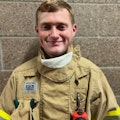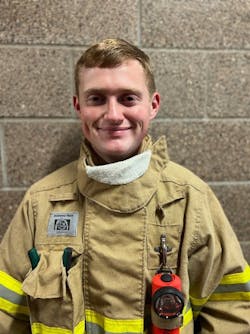Leadership or Love: What Does the New Era of Firefighting Need?
The fire service is inundated with books, articles, podcasts and social media posts. Never before has there been as much information-sharing as there is now. Firefighters across the globe share relevant information at the touch of a button. It has happened for me. A video on YouTube showed me how to advance hoselines into a structure by myself, which is something that I never even practiced during fire school.
One theme that’s ever present in the fire service is leadership. Surely, hardly a day goes by without leadership being a topic of discussion within departments. Leadership, leadership, leadership. However, is leadership a buzz word or a social concept?
I was so anxious to learn about leadership that I chose to pursue a master’s degree program that specializes in fire leadership.
Firefighters across this country are proclaiming, “We have no leadership” and “Our leadership sucks!” and “If we had leaders, we wouldn’t be short-staffed.”
Although I welcome the enthusiasm and passion of firefighters about any subject, I believe that there’s an overemphasis on leadership while there’s a significant need for embodying other qualities that are pursuant to human recognition and gratification.
The new generation
Negativity built the social construct from which I based all of my views when I joined the fire service three years ago. Furthermore, the tone in many stations has become toxic, and it shouldn’t be surprising that firefighters are creatures of their exposed environment.
As a young person, I looked up to firefighters as my heroes, but I can tell you that in the past decade, I have been exposed to negative actions and behaviors of firefighters and paramedics. Negativity about excessive call volume. Negativity about the patient who frequently requests help. Negativity about the lack of pay. Negativity about everything else. I have found that the blame for this negativity is pinned to the formal leaders in departments (chief, deputy chief, assistant chief, etc.). “The chief did this” and “The chief did that.” The attribution of this negativity to leadership seems to be because of the feeling of injustice in the work environment: lack of recognition, lack of social support and an overemphasis on personal satisfaction. “The job is about me, not them” seems to be the mindset of new firefighters
Although I don’t discredit the reasons for firefighters exclaiming bad leadership, I would like to see proof that these same firefighters are doing their best to combat negativity with positivity and love. It took me years to learn that negative firefighters seldom put in the extra work to make positive change nor care about leaders in the process. A leadership stigma has dawned in our present age, and firefighters are asking for answers about leadership, not love.
My reality check
The first time that I truly experienced love in the fire service was about 20 years after I said, “Mom, I want to be a firefighter.”
As a fresh, off-of-probation firefighter, I began to look to the stars to find my way in the department. What path should I take? I knew that, at minimum, I wanted to be a good, hard-working firefighter. So, in 2023, I signed up to attend the Lt. Joseph P. DiBernardo Memorial Training Seminar. The prestigious conference is taught by some of the most exceptional fire instructors from across the country who have seen it and done it.
After purchasing a ticket, I found out that I needed to be 25 years old to rent a car. I was only 23. After panicking, I hastily placed a phone call to the seminar organizers to see whether transportation could be provided. My heart was sinking. Throughout my whole fire service career, the only answer to which I had been exposed was “no.”
My call was answered by Retired Chief Joseph G. DiBernardo, who is Lt. DiBernardo’s father. After hearing my story, he instantly reassured me and said that he “knew a guy” who could help me. Without a second wasted, he had a number ready for me to write down and call. He referred me to “Brian.”
Still shaking—because I never heard the answer “yes” before—I meagerly texted Brian. He called me within an hour of my message. I never experienced this kind of responsiveness from a random stranger.
Brian and I chatted for a little while. Near the end of our conversation, he guaranteed me a ride to the conference for each day that I wanted to attend. He said that he would help make it possible at any cost. I was barely able to utter my gratitude to a mere unknown person who solved my issue with the pure kindness of his heart.
Although the story that I describe above might seem insignificant to you, it completely shocked me as a new firefighter. My entire impression of the fire service was turned upside down when the mere presence of love was incorporated into the job.
Many firehouses lack examples of love, kindness and positivity, which are important for their capability to make one’s perception of the profession meaningful. Seemingly, thousands of firefighters are unaware. I can verify, firsthand, that, as a newcomer, I instantly became aware of a whole different world of firefighting that existed outside of the one that I thought that I knew. It was earth-shattering.
Today, I recognize that every time that I put one ounce of love into the fire service, I receive a gallon in return.
Lots of firefighters don’t want to hear about the word love, but it’s the essential component of what makes us care about people, co-workers and ourselves. Have you ever noticed that love is much more difficult to give than negativity? It is for me.
I hold the firmest belief that the fire service has confused the priority of love and leadership. Not all leaders have love, but loving people are leaders naturally. Brian was a leader even before he met me, because he cared about the profession in the most loving manner. What he did is an impeccable example of the finest character that members of the fire service require.
Attitude changed forever
Fire service leaders and those who aspire to be leaders must look to see what type of genuine love that they provide to the public, new firefighters and those who are around them. Leadership can’t occur without a love for humankind and the firefighter who is next to you.
Although arguments are purported that new firefighters simply “don’t want to learn” or are “too self-centered to learn,” I would counter with the perspective of their environment.
Was the new firefighter actually included when that individual came to the station for the first time? This requires love.
Without love, can we really expect new members to want to learn from senior members? In the presence of unloving people, if it were me, I would rather sit on my phone by myself.
By simply showing love for this amazing profession, we can start to mend the dissonance that has perpetuated this career. Brian was the firefighter who taught me what it really means to be a loving firefighter—which isn’t a bad thing!
After my experience with Brian, my attitude and behavior were changed forever. Our next era must understand what it takes to be a genuine, loving, caring, insightful firefighter—not just what leadership is conceived to be on paper. It starts with doing the right thing from the heart. Once love for the profession is started, it is nearly impossible to extinguish.
About the Author

Collin Hofschulte
Collin Hofschulte is a career firefighter, fire instructor and medical coordinator for the Duluth, MN, Fire Department. He has served in various educational roles since 2020, first as a paramedic preceptor for Mayo Clinic Ambulance then as a Fire Instructor II for fire instruction and rescue education. Hofschulte recently was appointed as a principal for the NFPA Technical Committee on Emergency Service Organization Risk Management. He is an alumnus of the Mayo Clinic School of Health Sciences Paramedic Program. Hofschulte holds an Associate of Arts in Liberal Arts & Sciences from Riverland Community College, a Bachelor of Science in fire administration from Columbia Southern University (CSU) and a Master of Science in fire executive leadership-human resource management from CSU.
